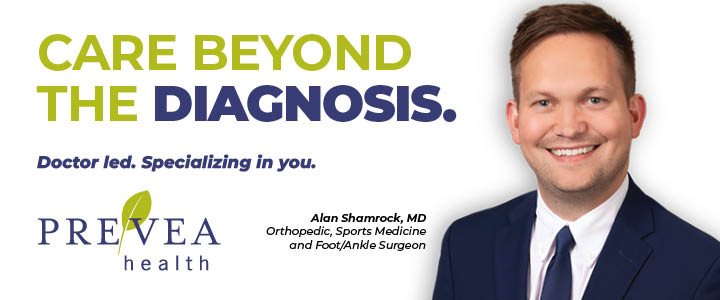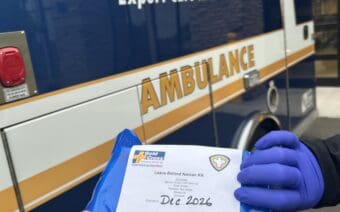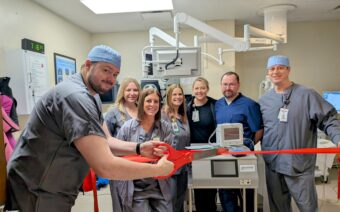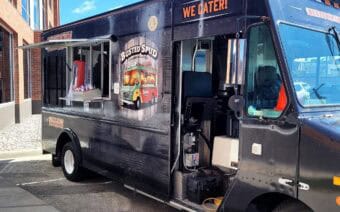
October 6, 2022
NORTHEAST WISCONSIN – Transitioning back into the civilian workplace after a career in the military, or after a tour of duty as a reservist, can be a difficult and anxious time for veterans and military service members.
Steve Janke, a veteran himself and the founder/CEO of Mission Wisconsin, said it’s his goal to help make that transition easier.
Janke said he joined the Marine after a year of college – saying he quickly realized it wasn’t for him.
“I lacked discipline and structure, so I did what a lot of small-town kids do – I joined the Marine Corps so I could see the world and experience new things,” he said. “I was stationed in Hawaii for three years and did 13 months in Japan. My story is one of soil, service and of roots – it’s a Wisconsin story.”
Janke said he probably had the easiest transition on the face of the earth.”
“I was at Camp Pendleton (in California) at Recruits Separations Platoon,” he said. “I got my plane ticket information that morning, got a ride to the airport in San Diego, boarded a plane nonstop to Dane County Regional Airport, got picked up at 2 p.m. by my family and was milking cows later that night. I like to joke that I did the only thing harder than being a Marine – being a dairy farmer.”
Janke said he helped run the family-owned dairy farm in Westfield (a village about 50 miles north of Madison) with his father for 15 years.
“Most of us know the economics of farming and that it’s not easy,” he said. “We were doing all the work 365 (days a year), 24 hours a day, seven days a week. In 2010, I started building my transition plan, and in 2014, I executed that plan.”
Janke said that plan was a move into politics and government service.
“I went from physically shoveling manure, to verbally doing it,” he said jokingly. “That led me to understand the value of transition, building your network and taking that holistic approach to it. Through my government work, I built lots of relationships.”
Janke said for him, transitioning from the Marine Corps to farming was simple, but transitioning from farming back into the “real world” was more difficult.
“That’s where I learned the value of being prepared,” he said. “There’s a lot that goes into transitioning from one thing to the next, especially when it comes to entering back into the civilian world.”
Government work
From 2017-19, Janke said he worked for the Wisconsin Department of Veterans Affairs.
“I was taxed with creating this model for talent attraction and then acting on it,” he said. “After that, I was picked up by the Wisconsin Economic Development Corporation (WEDC) to continue running the program for the state. Once the new management of WEDC came in, along with the global COVID-19 pandemic, they ended all their talent attraction efforts inside the state government.”
During this time, Janke said he visited four countries, 16 states and did 24 events in front of thousands of service members and their families.
“I stood in front of them and said, ‘The great State of Wisconsin is going to be here for you and your family when you’re ready to transition,’” he said. “I owed them that – that’s why I started Mission Wisconsin, because I didn’t want to go back on my promise.”
Mission Wisconsin
Janke started Mission Wisconsin – a company focused on helping Wisconsin employers connect with transitioning service members, spouses and veterans – in July 2020.
“The community around supporting veterans is what makes Wisconsin unique,” he said. “It’s not only about veterans supporting veterans, but you can go anywhere in the state and there are people who support you.”
Janke said Mission Wisconsin is a candidate-focused company.
?

Mission Wisconsin founder/CEO Steve Janke recently attended the Hiring Our Heroes career summit in Ft. Carson, Colorado. Submitted Photo
?“It’s free for the military community to use our services,” he said. “We want to make sure they find that next mission, and we want it to be in Wisconsin. More importantly, we want that military family to successfully transition.”
Janke said Mission Wisconsin has partners who have invested in them.
“They understand the value of hiring veterans and the value of making that transition successful,” he said. “CNH Industrial, Fincantieri Bay Shipbuilding, Oshkosh Defense, Pierce Manufacturing, Wisconsin Converting, Associated Bank and Kwik Trip have all invested in us because they understand it’s a solid investment in the state and their community. We are out there talking about their brands to the military community and then helping those service members connect to their company and their communities – the companies understand that’s an economic driver.”
Veteran-ready vs. veteran-friendly
Janke said the amount of help and involvement companies have for military personnel varies.
“There’s not a company out there that isn’t veteran-friendly,” he said. “If you ask any company, ‘Do you want to hire a veteran?’ They will say ‘yes.’ But the difference between veteran-friendly and veteran-ready is about the size of Lake Winnebago.”
Janke said Mission Wisconsin can serve as a liaison for veteran-ready companies to recruit qualified military candidates.
“Associated Bank is a great example of a veteran-ready company,” he said. “If you’re in the guard or reserve when you work for Associated Bank, and you get called up for active duty, they will match the money you are losing for the length of your commitment – that’s huge for the military community. It’s the little things like that.”
Janke said CNH Industrial is another great example of a veteran-ready company.
“Every time a veteran is hired at CNH, they get paired with a veteran mentor from their employee resource group,” he said. “That person is there to say, ‘Brother and sister, I’ve been where you are, welcome to the team and if you have any questions, just ask.’ The companies that get it, get it – it’s part of their culture.”
What can companies do?
LeRoy Frahm, Ombudsman Director of Wisconsin and a veteran himself, said there are things companies can do to get closer to that veteran-ready status.
Frahm said he wanted to use his knowledge of USERRA (Uniformed Services Employment and Reemployment Rights Act) to do what he could to help service members and employers.
“I’m a neutral party and explain what the law is,” he said. “I learned in the military to dig into all the rules and regulations. I first started teaching USERRA in the mid-1990s at Robins Air Force Base in Georgia. When I retired in 2005 after my last operation Iraqi Freedom, it made sense to volunteer my time.”
Frahm said he works with companies to make sure their handbooks are complying, and their human resources training is current.
“A company might say they are military-ready/military-friendly, but that doesn’t mean their handbook is in line with the law,” he said. “More importantly, are the supervisors and staff all on board? The worst employer handbook when it comes to military leave policies and the law, is the one that says, ‘We abide by all federal and state laws.’ If you don’t name what those (laws) are, how would a frontline supervisor know what the laws are? To reduce embarrassment, maybe the supervisor is ‘winging it,’ compared to seeking help.”
Frahm said he doesn’t actively advertise his services but lends a hand where he can.
“I pass out my business card wherever I go to help prompt businesses to think about USERRA and what’s in their handbook,” he said. “Sometimes, I get a company to take me up on the offer, and occasionally, I get one out of the blue. I’ve reviewed handbooks from large, small, private and public companies. It’s not unusual to find mistakes or things that are absent, even in a good handbook. I’ve also run into companies that have nothing in their handbook.”
Frahm said he recently worked with a large company that had a reasonable policy, but it was outdated.
“I could tell by the language it was dated to the mid-1990s when USERRA became law,” he said. “It got amended once in about 2000, so they were happy for me to sit down with them and point out different areas that needed fixing. I believe if a company knew it had a mistake, it would want to get it fixed.”
In his role as Ombudsman Director of Wisconsin, Frahm said he has the opportunity to present companies with the Patriot Award – which recognizes supervisors and bosses nominated by a guardsman or reservist employee for the support provided directly to the nominator.
“The State of Wisconsin presents about 300 Patriot Awards per year,” Frahm said. “I was recently in Neenah at McMahon Engineering/Architects presenting the award because McMahon does a great job of taking care of their active-duty personnel, and one of the employees recognized that and nominated them.”
Frahm said another pertinent example of proactive changes came from a police department a couple of months ago.
“They called me and asked, ‘What can I do to make my handbook more friendly, because I’d like to hire more reservists/guardsman?’” he said.
Frahm said many military personnel already possess several of the qualities departments want in a police officer.
“They’re physically fit, drug-free, have no criminal record, know how to take responsibility, have a good image and a professional appearance and are disciplined,” he said.
Frahm said by making updates and changes to a company handbook can help make a military personnel’s back into the civilian workforce easier for both them and the company.
A win-win.
Frahm said prospective companies looking to improve their handbooks can visit ESGR.mil/wi, email him directly at leroy.frahm@lawrence.edu or call his office at (920) 832-6722.
Janke said companies interested in connecting with Mission Wisconsin can visit mission-wisconsin.com.
 Packers Athletic Club to become newest addition to Titletown
Packers Athletic Club to become newest addition to Titletown Rhinelander Brewing Company brewing up success in ‘Hodag’ country
Rhinelander Brewing Company brewing up success in ‘Hodag’ country








